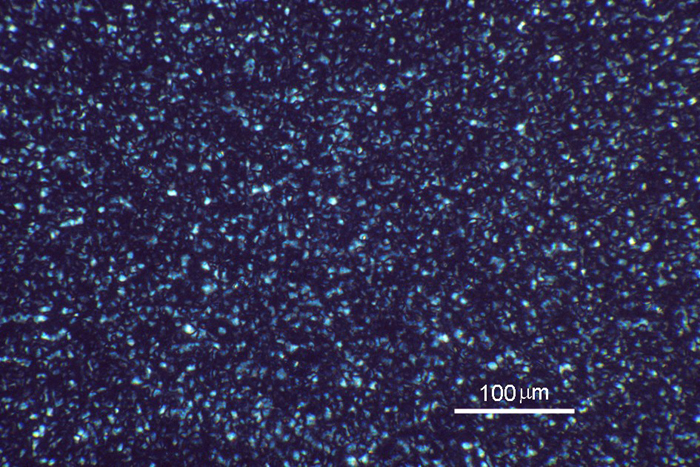Micrograph Library
Browse the libraryAdvanced searchSystemsCompositionsTechniquesKeywordsPhase diagramsHelpPreferencesAbout the micrograph libraryTerms of useContribute micrographs!FeedbackLinksCredits Print this page

Micrograph 161 and full record

- Micrograph no
- 161
- Brief description
- Glass ceramic, heat treated at 750°C for 3 hours
- Keywords
- ceramic
 , glass
, glass 
- Categories
- Ceramic
- System
- LAS: Li2O-Al2O3-SiO2
- Composition
- Not specified
- Standard codes
- Reaction
- Processing
- Heat treated at 750°C for 3 hours
- Applications
- LAS glass ceramics are principally used for domestic cooker hobs and cookware. LAS and other glass ceramics can also be used for microwave radomes, vacuum and laser envelopes, telescope mirrors, and in bioceramic applications.
- Sample preparation
- Thin section
- Technique
- Transmitted polarised light microscopy
- Length bar
- 100 μm
- Further information
- Glass ceramics are materials that are cooled from the melt in the form of a glass, and then heat treated to induce controlled crystallisation of the glass. Heterogeneous nucleation is carried out at a temperature to maximise the nucleation rate (common nucleating agents include TiO2 and ZrO2), and the temperature is then raised sufficiently to cause the nuclei formed to grow rapidly.
Glass ceramics are strong, reasonably tough, transparent to IR radiation, have a low coefficient of thermal expansion, a high resistance to thermal shock and a low thermal conductivity, which makes them very useful in domestic applications such as cookware and cooker hobs.
The most common glass ceramic system is LAS (Li2O-Al2O3-SiO2), but others include MgO-Al2O3-SiO2, Na2O-BaO-Al2O3-SiO2, and Li2O-MgO-Al2O3-SiO2. - Contributor
- Dr K M Knowles
- Organisation
- Department of Materials Science and Metallurgy, University of Cambridge
- Date
- 09/08/02
- Licence for re-use
 Attribution-NonCommercial-ShareAlike 4.0 International
Attribution-NonCommercial-ShareAlike 4.0 International- Related micrographs
- Micrograph 160: Glass ceramic, heat treated at 750° C for 3 hours (100 μm)
- Micrograph 162: Glass ceramic, heat treated at 840°C for 3 hours (100 μm)
- Micrograph 163: Glass ceramic, heat treated at 840°C for 3 hours (100 μm)
- Micrograph 164: Glass ceramic, heat treated at 900°C for 3 hours (100 μm)
- Micrograph 165: Glass ceramic, heat treated at 900°C for 3 hours (100 μm)
View image alone .. in a new window
Help is available on downloading images

